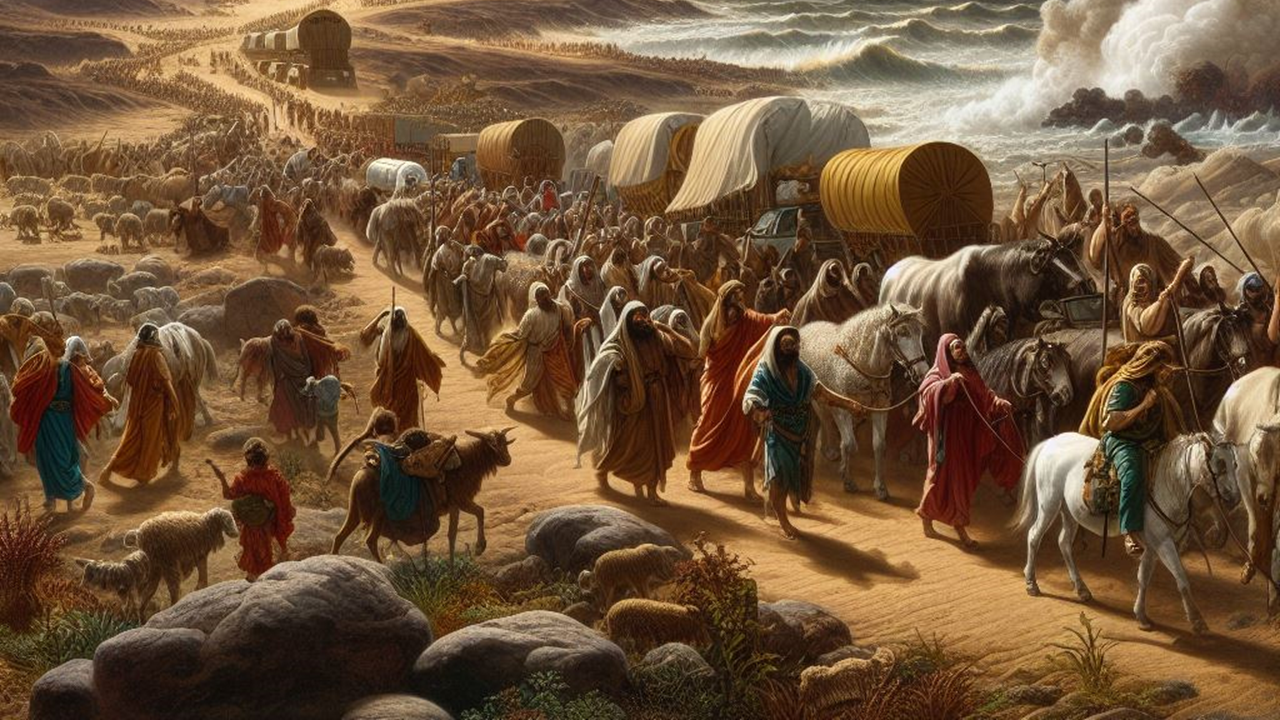这是什么意思?What does this mean?
Remember these points
I put these points at the top of my sermon-prep template to remind myself every week:
- Show that main point of passage relates to Jesus and his saving work
- (1 Cor 1:18) A truly gospel-centred message will not be acceptable in a synagogue or mosque
- Did I proclaim the gospel as the headline news of the sermon, rather than as a “by the way…”?
- Unbelievers are called to repent, believe, and be saved
- Believers are encouraged to abandon their old self, renew their minds, put on the new self in Christ
- Preach simple sermons, so that God’s people can see Christ more clearly and love him more dearly
News
Praise the Lord! We will have a baptism next week. Pray for the sister about to be baptised, for her faith, and for her continued commitment to the Lord and the church. Pray also that she’ll be a light to her husband and family, that they will also come to know Jesus Christ through her testimony.
Hook
What do you think these pictures depict?

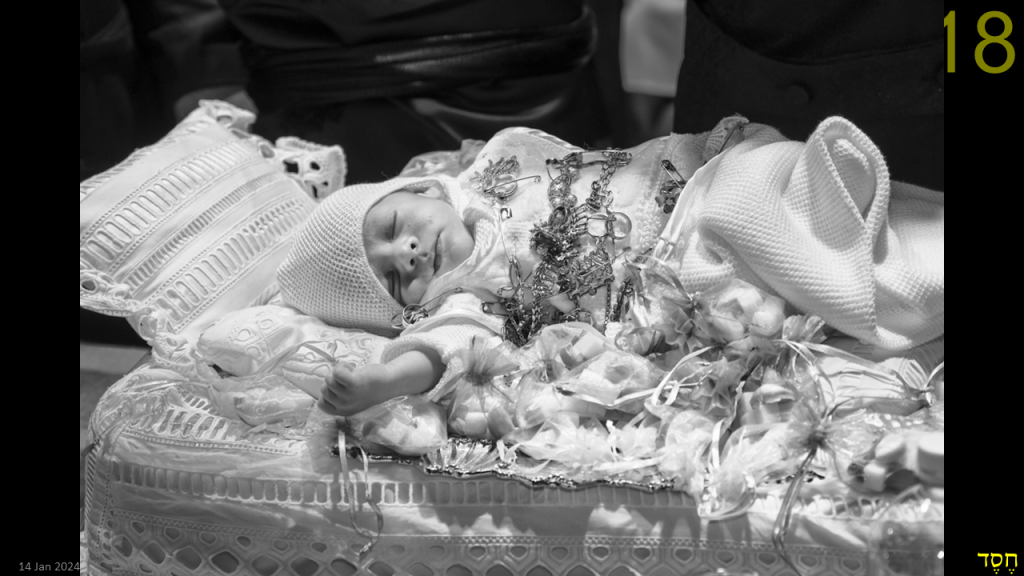
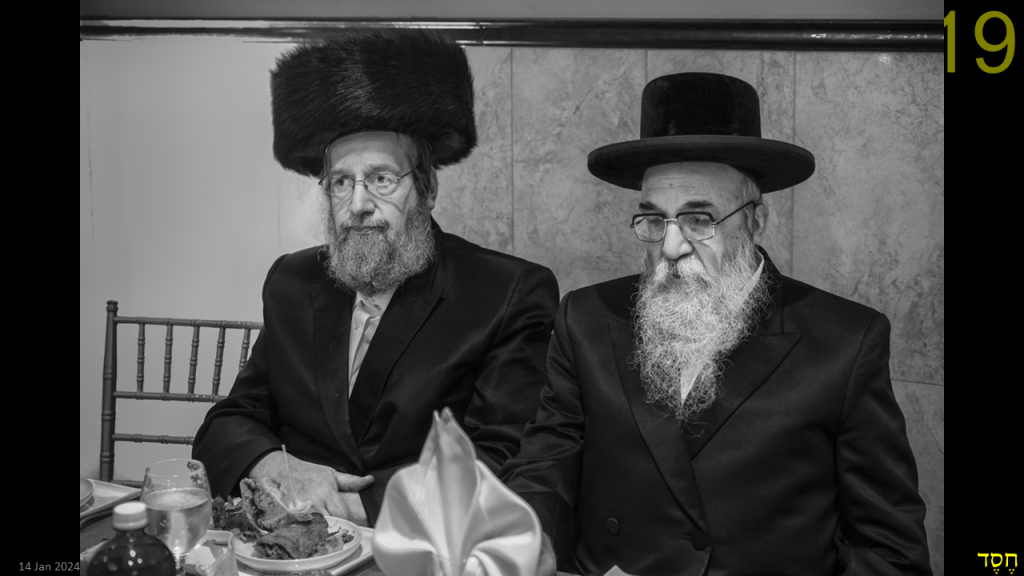





What do you think these pictures depict?
The series of pictures show the highlights of the Jewish Pidyon Haben (פדיון הבן) ceremony. “Ben” in Hebrew means son (“ha” is the definite article, like “the, le, la, les”); Pidyon means “redemption.” So this is the ceremony where the firstborn son is redeemed (a key topic of today’s passage).
The descriptions for each pic (numbers match the slides):
- The mother and the baby.
- The baby in all his glory.
- Two rabbis observe the ceremony.
- The father carrying the baby to be presented to the Kohane (Kohane is Cohen in English, meaning Hebrew priest. Cohen is a very common surname today).
- The father offering to buy the baby back from the Kohane for five shekels.
- The Kohane making the ritual priestly blessing.
- The coins are commemorative coins minted by the Israel Mint (this is the 2005 edition). On their website, this set is listed at $378. The “Aleppo Codex” you see on the coins refer to a manuscript of the Hebrew Bible (what we call the OT) from the Middle Ages. Israel Mint in Chinese is 以色列铸币厂 Yǐsèliè zhùbì chǎng.
- The baby being decorated with gold jewelry.
Passage


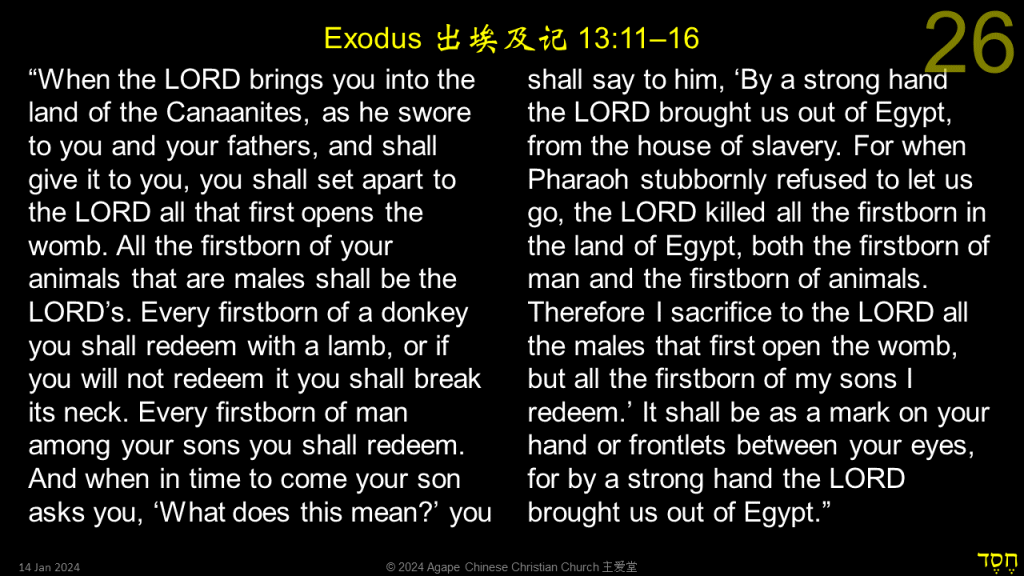
The image is another AI-generated image. I asked for “generate image of israelites leaving egypt.” The AI generation isn’t too good. If you look closely at the people’s faces, you can see that they’re quite strange looking!
Outline 大纲
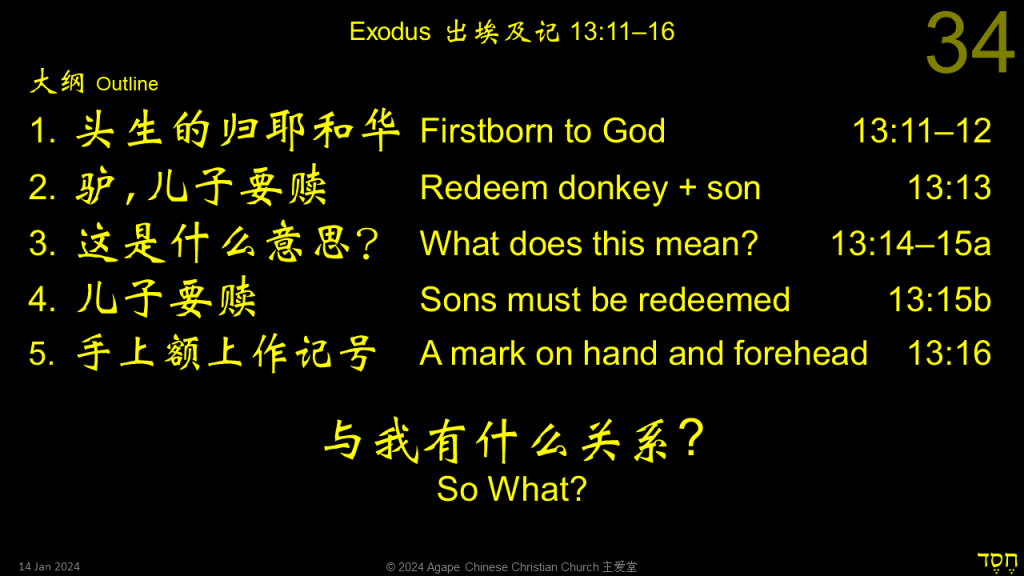
Section 1 头生的归耶和华 Firstborn to God
Passage
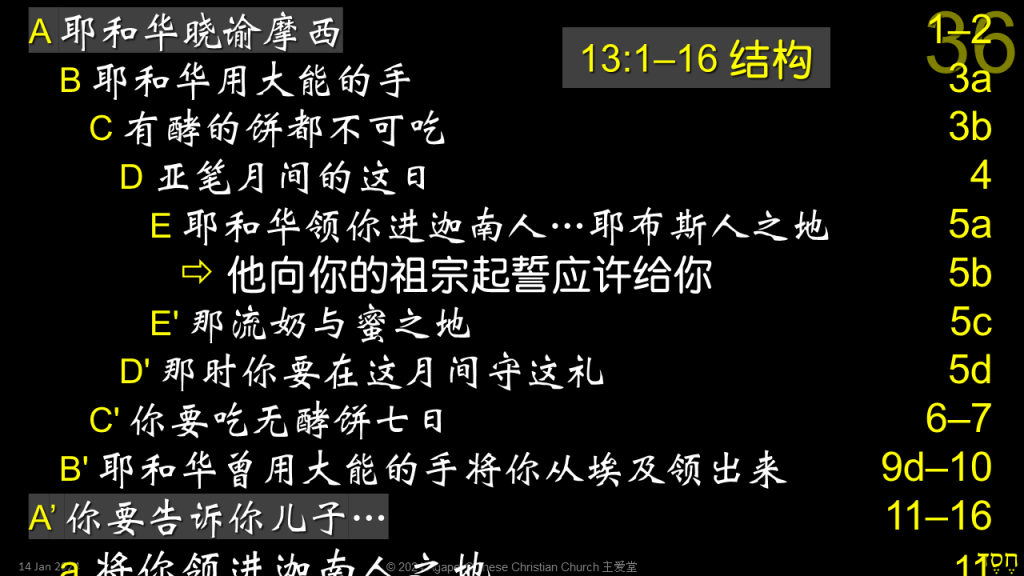
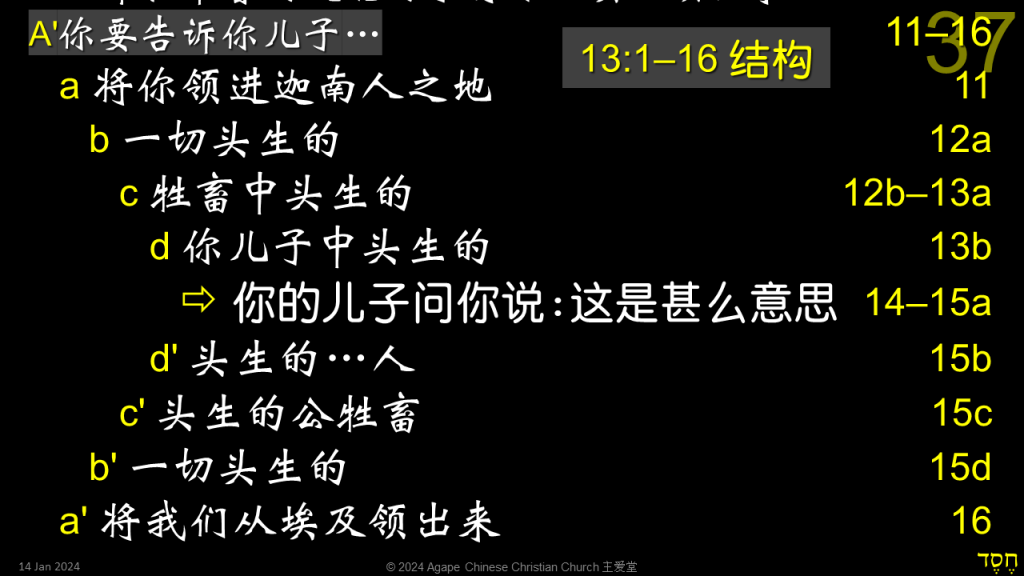
Structure
Today we continue with 2nd part of structure.
Exo 13:1–16 is one chiastic structure, the centre of which is 13:5b, “which he swore to your fathers to give you.”
13:1–2 pairs up with 13:11–16 (which is today’s passage).
13:11–16 itself is a chiasmus, the centre of which is 13:14–15a, “when …your son asks you, ‘What does this mean?’”
13:1–2 begins with, “The Lord said to Moses,” while 13:11–16 centres on, “When your son asks you…”
Today’s topic
What does this mean?

Emphasis again on God’s promise
God’s promise will always, always be fulfilled. We can trust God.
First opens the womb
In v. 12, he CUV has 头生 (Tóu shēng, meaning firstborn) appearing twice. The 1st one translates the Hebrew “first opens the womb,” while the 2nd is the usual “firstborn.” The ESV of Exo 13:12 translation is much closer to the Hebrew.
To give over
In Exo 13:12, the verb translated “to set apart” in the ESV is not the usual verb for this action.
CUV also doesn’t show this distinction.
The actual Hebrew verb used is like “to pass over.”
This is how Moses tied this passage to the Passover event.
All firstborn belongs to YHWH
Since the firstborn represents the siblings and family, the entire family belongs to YHWH.
This is done with every family: so all of Israel belongs to YHWH.
This is what it means when YHWH said, “Israel is my firstborn son.” (Exo 4:22)
Section 2 驴,儿子要赎 Redeem donkey + son
Passage
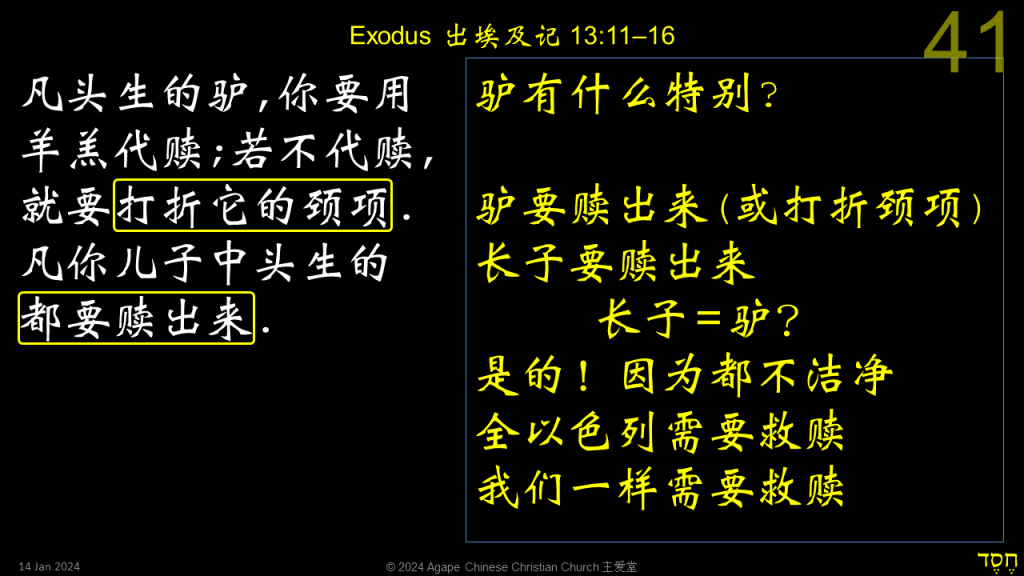
Donkey
What so special about a donkey? Why can’t a donkey be given to YHWH?
It’s because donkeys are ritually unclean. It’s the only unclean animal that’s found within the Israelite community. It’s indispensable as a pack animal.
Because it’s unclean, it can’t be given to YHWH, so it must be redeemed by substituting a lamb.
If you don’t want to sacrifice the lamb, then you’ll have to kill the donkey by breaking its neck.
Tradition has it that the donkey is killed by a hatchet blow to the neck from the back of the animal. This process is very different from the usual way a sacrificial animal is killed, so as not to make the killing of a donkey look like an ordinary sacrifice.
Firstborn son = donkey
Donkey they have to redeem (by a lamb substitute).
Firstborn son they have to redeem (most likely by a lamb substitute as well, though the Bible doesn’t say).
Doesn’t this make firstborn son like a donkey!
Yes! Because both are unclean.
All Israel is in need of redemption.
We also are in need of redemption.
Lessons
Section 3 这是什么意思?What does this mean?
Passage
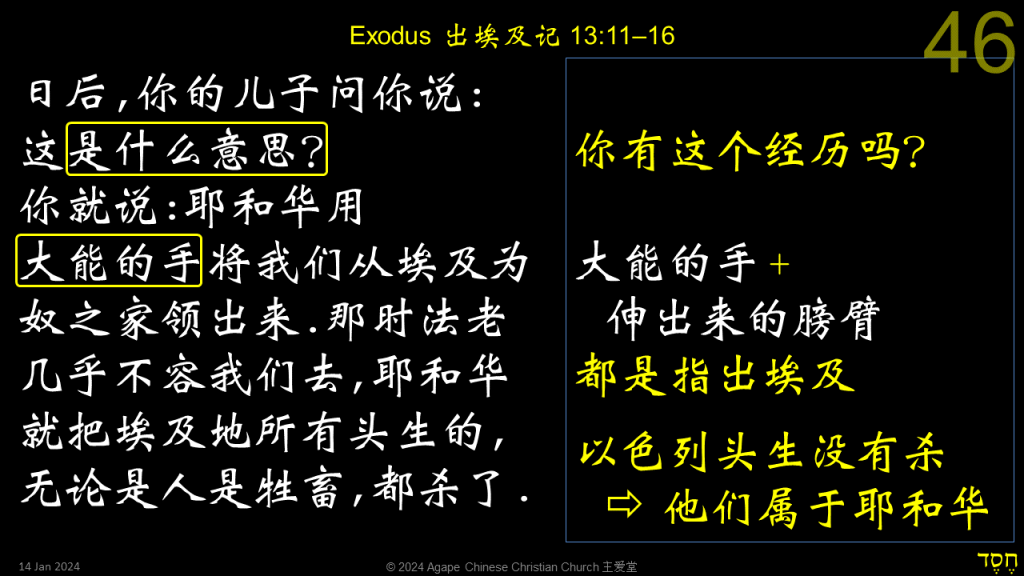
What does this mean?
Have you ever experienced your children asking you what something means? Or why we’re doing something?
Or, if you’re not a parent, have you ever asked your parents a similar question?
I remember my son, when he was still quite young, would ask me all the time, “Why is this so?” or “What does this mean?”
Children are naturally curious, and this is the best opportunity to tell them about God and Jesus.
Not a parent?
What if you’re not a parent, so there’s no children to ask you what or why?
You might have younger siblings.
You might be teaching younger kids in Children’s Sunday School.
Your behaviour, your speech, your character will all become examples to those younger than you.
It’s also important for you to know God’s words so that you can pass it on to the younger ones.
A strong hand
This expression often appears together with “outstretched arms.” From Exodus, through the rest of the five books of Moses (the Pentateuch), to the Psalms, the historical books (Kings, Chronicles), the prophets (Isaiah, Jeremiah, Ezekiel, Daniel), Acts.
Every time this expression refers to the Exodus event.
Israelite firstborns were spared
On Passover night, YHWH killed all of Egypt’s firstborn, both humans and animals.
Israelites were spared (because of the blood of the Passover lamb), thus Israel belongs to YHWH.
Lessons
Section 4 儿子要赎 Sons must be redeemed
Passage
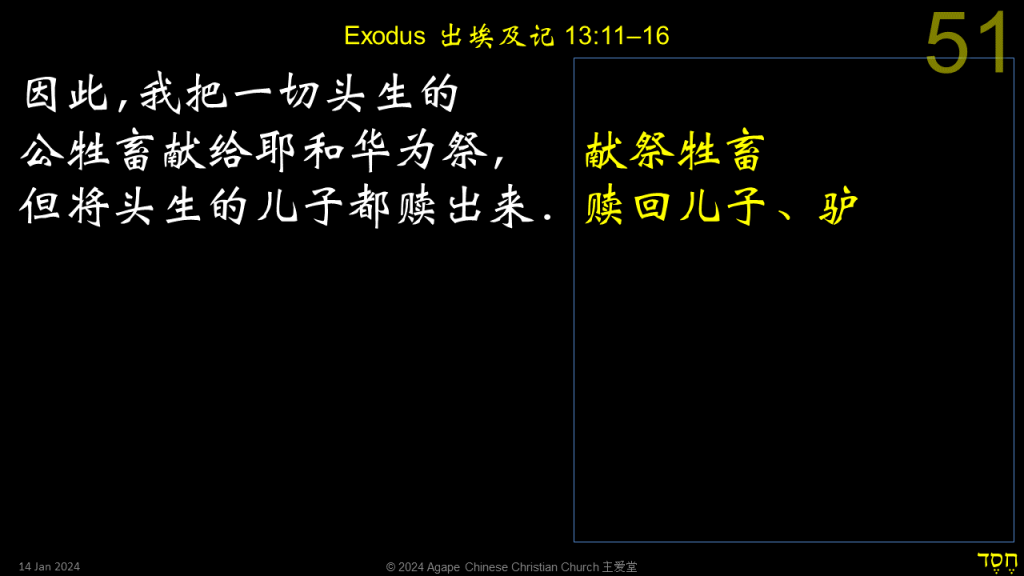
All firstborn of animals (except the donkey) are sacrificed to YHWH.
All firstborn sons were redeemed (same as the donkey), most likely by sacrificing a lamb.
This is the lesson of redemption and substitutionary atonement.
All this points to Jesus as the ultimate Passover lamb, and our ultimate Exodus from sin and death into the kingdom of God.
Lessons
Section 5 手上额上作记号 A mark on hand and forehead
Passage
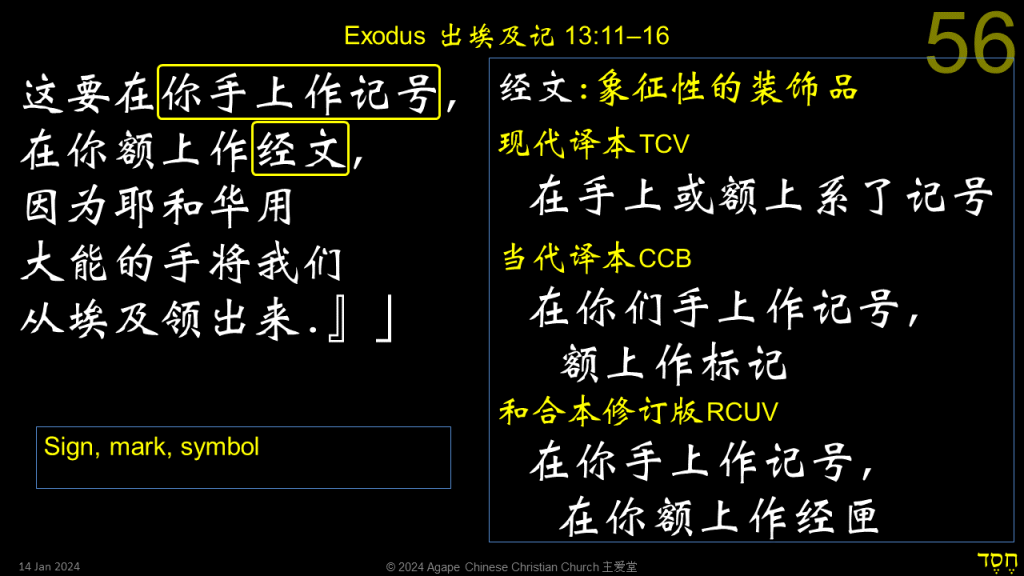
Strange translation in CUV
The description here (Exo 13:16) of putting reminders on your arms and foreheads is slightly different from Exo 13:9.
Here the Hebrew word is “symbol,” replacing the earlier word “reminder.”
The Hebrew means some form of symbolic ornament, a physical object used figuratively for perpetual remembrance.
Other Chinese translations are much better.
All modern English translations use “sign,” “mark,” or “symbol.”
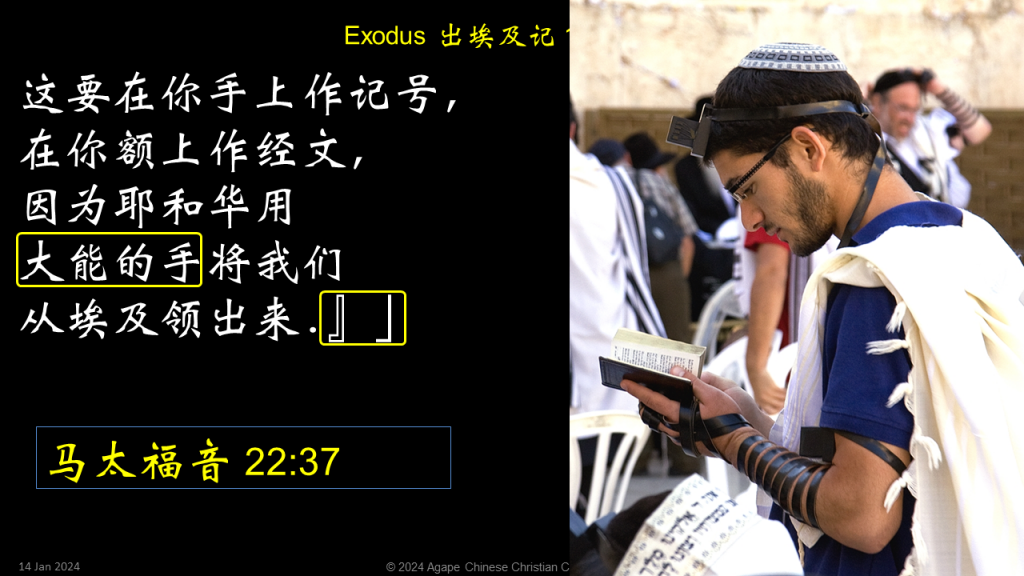
This repeats Exo 13:9.
Quotation marks
The CUV ends with 2 quotation marks at the end of Exo 13:16, while most English translations have only one.
Most translations end the father’s speech at the end of Exo 13:15, which is probably the more correct way.
TCV follows CUV, while CCB follows most English translations.
Tefillin
Even today, Devout Jews wear the tefillin when they pray.
The picture shows a Jew wearing the tefillin (left arm and forehead).
Lessons
We don’t wear the tefillin, but we also keep God’s word (the Bible) in our minds and in our hearts.
Like Jesus said, “You shall love the Lord your God with all your heart and with all your soul and with all your mind.” (Matt 22:37)


You can’t love someone you don’t know. The only way to know God is through the Bible.
This is why we keep God’s words in our minds and hearts.
So What?
Lessons

Two important lessons to remember:
- What should we do for our children?
- What we know about God.
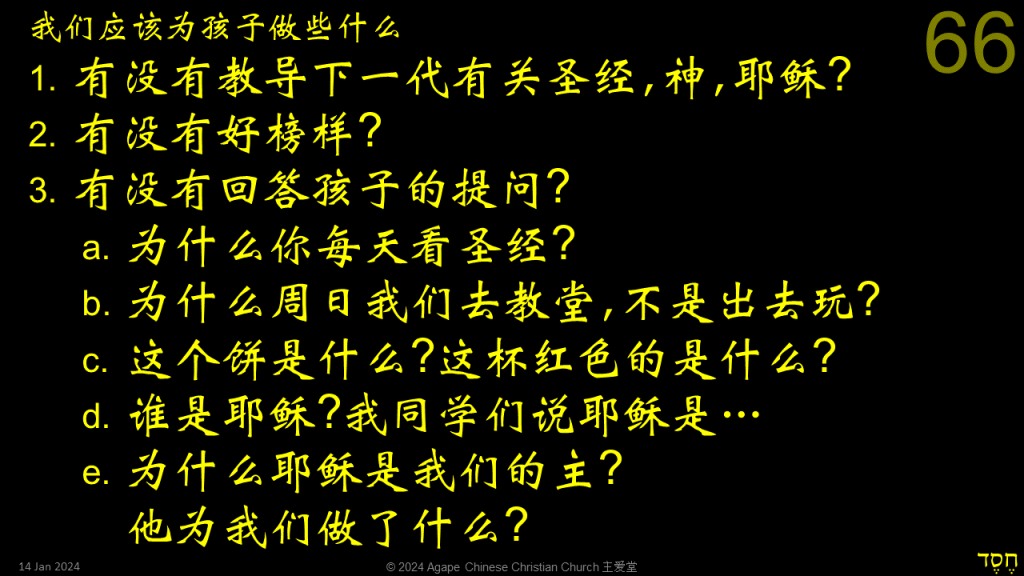
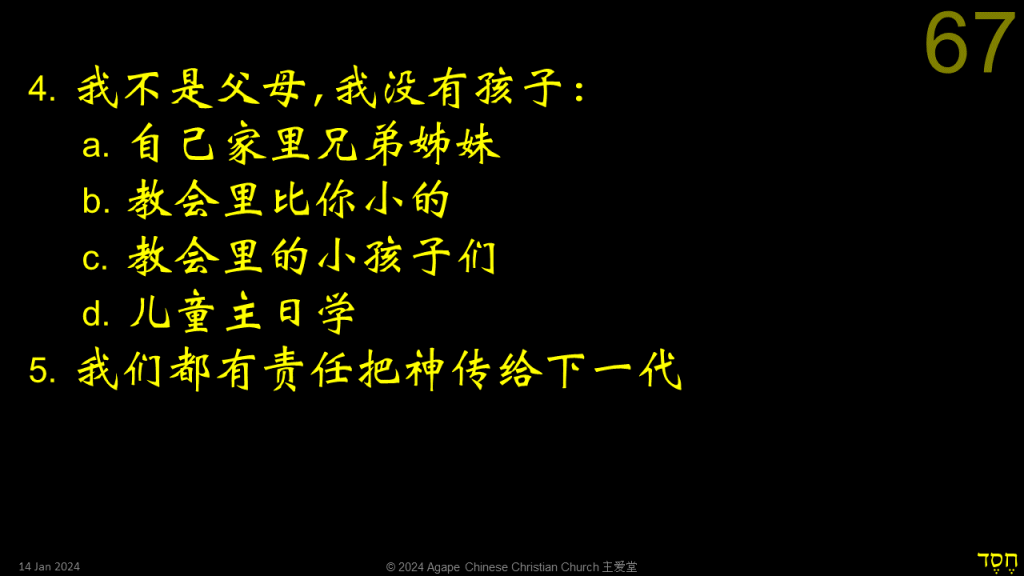
What we should do for our children:
- Did we teach the next generation about the Bible, God, Jesus?
- Are we giving good examples for our children?
- Have we answered our children’s questions?
- Why do you read the Bible every day?
- Why do we go to church on Sundays, instead of going skiing like my friends?
- What is this wafer that you’re eating? What is this red thing you’re drinking?
- Who is Jesus? My friends say Jesus is…
- Why is Jesus our Lord? What has he done for us?
- I’m not a parent, I don’t have kids:
- You might have younger brothers and sisters at home
- In the church there are those younger than you
- In the church there are little children
- There is the children’s Sunday School
- We ALL have the responsibility to tell the next generation about God.
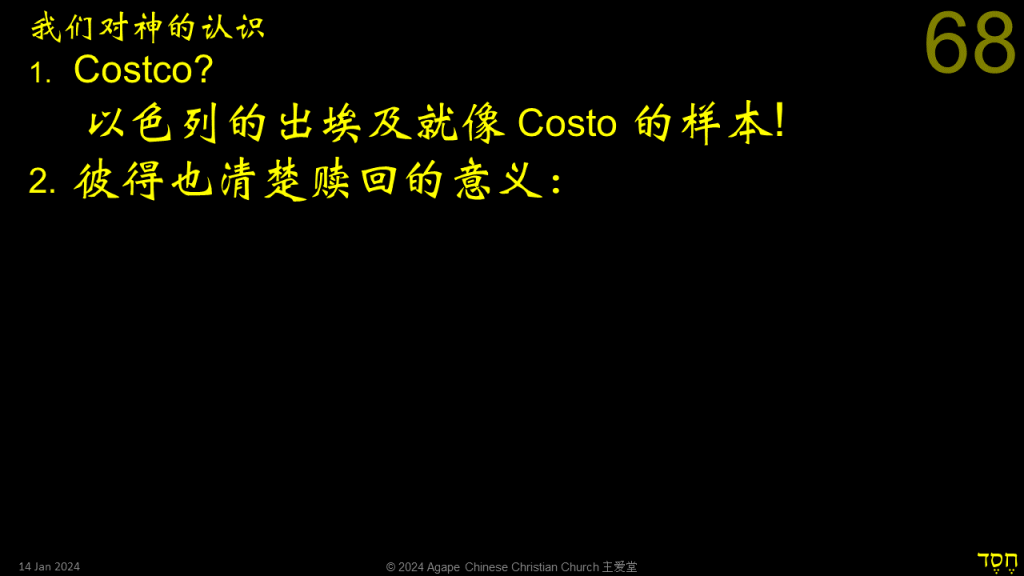
What we know about God:
- Costco?
The Exodus is like the food samples at Costco! - Peter had the same understanding about redemption (1 Pet 1:18–19)
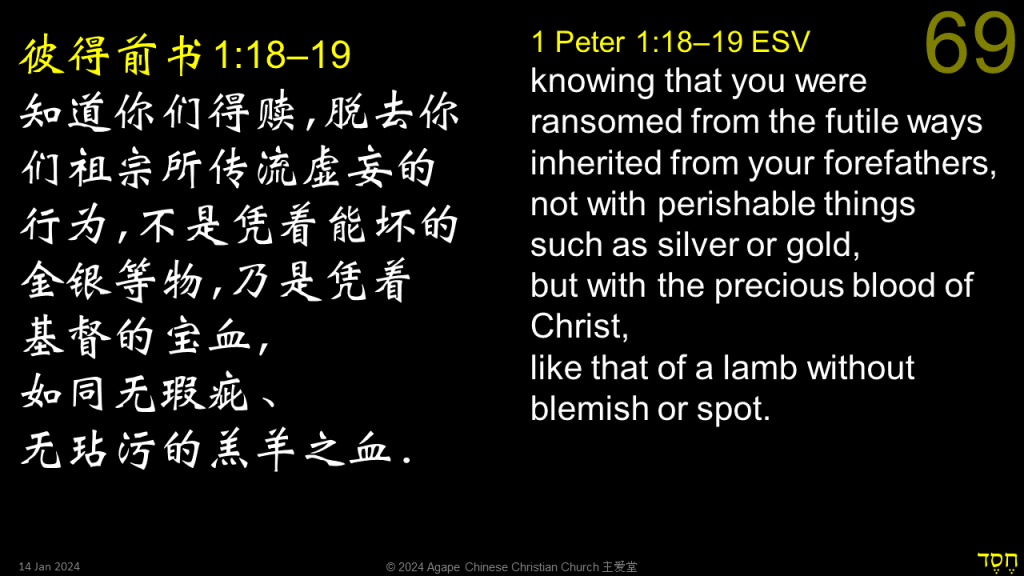
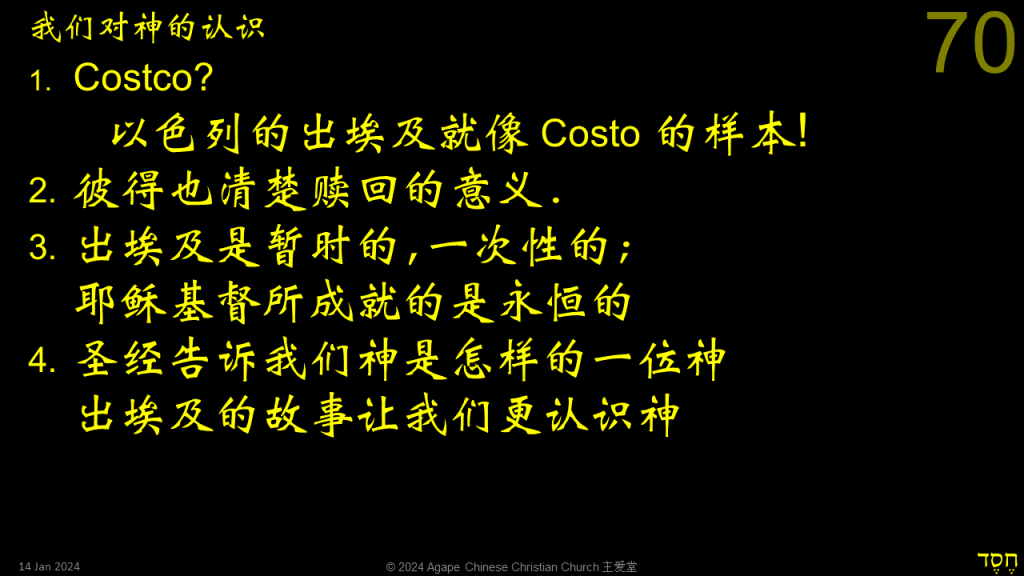
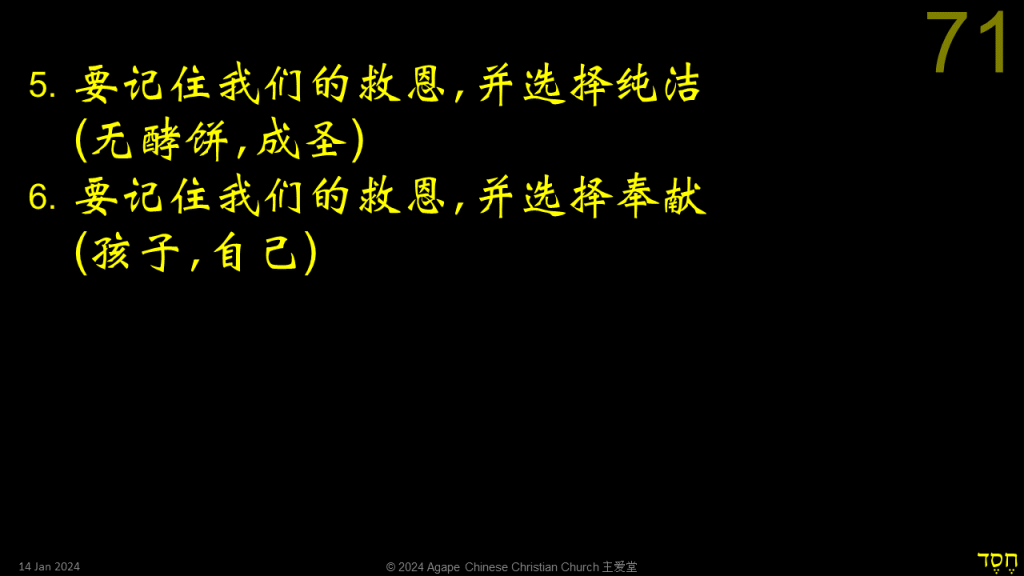
- The Exodus was temporary, a one-time thing;
What Jesus accomplished was eternal. - The Bible tells us what God is like.
The Exodus stories let us know more about God. - We have to remember our salvation, and choose purity (Unleavened Bread, sanctification).
- We have to remember out salvation, and choose dedication (dedicate our children, ourselves).

